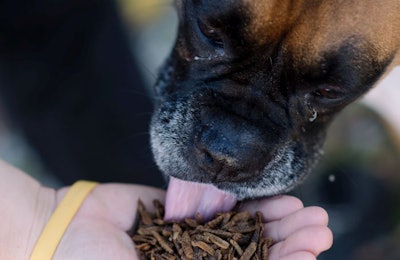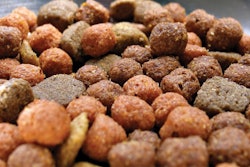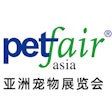
Mexico’s pet food industry may be poised to take advantage of insects as novel pet food protein sources. As in many other cultures, insects form a traditional part of many Mexicans’ diets, which means people may have few taboos against feeding insect-based pet foods to their dogs or cats. At the same time, Mexican entrepreneurs could provide employment and income by starting insect protein production facilities, such as cricket or black soldier fly larvae farms. However, insects would require Mexican federal regulatory approval for use in pet foods.
“Mexico could be a good country to accept insects as raw materials for pet food,” said Miguél Lopéz, pet food industry consultant and organizer of Foro Mascotas. “While it sounds innovative, it is actually normal for a portion of the human population to have insects as a delicacy sometimes.”
Insects relished as human food
These insect delicacies include gusanos de maguey (cactus worms), huevos de hormiga (ant eggs) and chapulines (crickets/ grasshoppers). For example, La Tequila, a restaurant in Guadalajara, Jalisco, Mexico, serves quesadillas made with chapulines. In that dish, the morita pepper sauce dominates over the mild, nutty flavor of the insects.
“The crickets are the least expensive, and you can get them with lime and chili or just salty,” he said. “The ant eggs and the cactus worms are eaten seasonally and they are very expensive. You eat them fried in tacos with guacamole and they are really tasty.
“Mexican culture has accepted the consumption of eggs, worms and insect adults for a lot of years,” he said. “Although it is not the practice of 100 percent of our population, it is very much accepted; therefore the introduction of these type of ingredients for animal companion products can be a good asset.”
Insect farms as small business opportunities
While insect farms in the United States strive to automate processes to reduce labor costs, insect farm start-ups in Mexico could start low-tech and thereby provide employment, said Jeffery K. Tomberlin, PhD, associate professor and AgriLife research fellow in the department of entomology at Texas A&M University and chairman of EVO Conversion Systems.
At least one company is now working to produce insect protein from black soldier fly larvae, said Tomberlin.
“The model for mass production of the black soldier fly can be as low or high tech as you like,” he said. “This is the beauty of the system.”
These insect protein production facilities could be located in either rural or urban areas, he said. The farms can start small then grow with demand while integrating robotic labor with that of people.
What’s more, considering Mexico’s generally warmer climate range than the United States, an insect farm in Oaxaca would not need heating like similar operation in Missouri. However both may need cooling systems for the summer.
“I am very excited to work with other companies in Mexico interested in developing the black soldier fly. I always say, ‘stay focused on your goals and grow with demand.’ Such an approach is less stressful and could lead to success.”
Insect protein production facilities could start as small-scale family and community projects, said Lopéz. Even if the insect farms don’t reach an industrial scale needed to supply the pet food industry, the insects could still be used as feed for backyard chicken flocks, local egg and poultry producers or aquaculture opperations.
Regulation of insects as pet food ingredients in Mexico
In Mexico, pet food is regulated by the federal agriculture ministry, the Secretariat of Agriculture, Livestock, Rural Development, Fisheries and Food (Secretaría de Agricultura, Ganadería, Desarrollo Rural, Pesca y Alimentación [SAGARPA]).
Although accepted in human foods, SAGARPA would have to approve insects as ingredients in pet food, said Lopéz.
“There is no protocol for official approval of new ingredients,” he said. “If you decide to make a pet food with insects, surely SAGARPA will ask you for written support from articles and experiences of using the ingredient for pets in other countries.”
Such evidence could come from the United States, where several pet treat companies now use insects, including EntoBento and Jiminy's, two cricket-based dog treat companies, despite lack of US Food and Drug Administration approval for insects in US pet food or American Association of Feed Control Officials definitions.

















